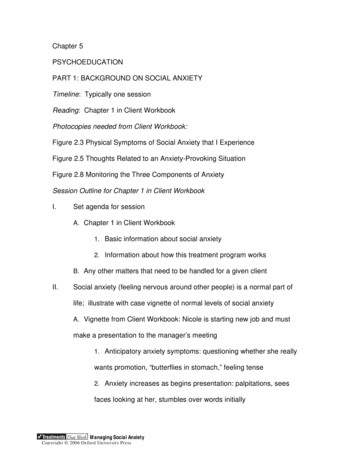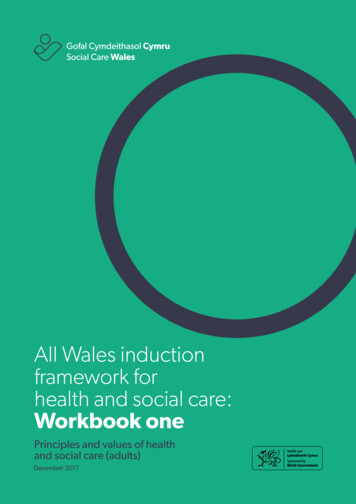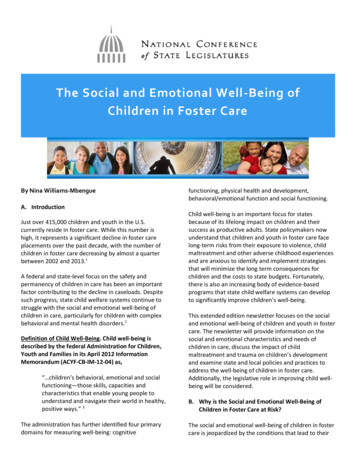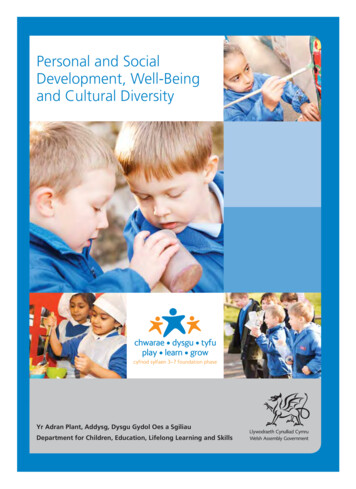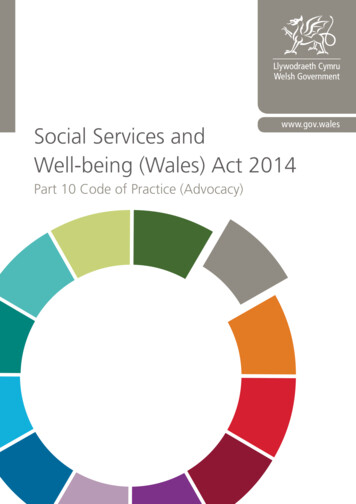
Transcription
Social Services andWell-being (Wales) Act 2014Part 10 Code of Practice (Advocacy)
Part 10 Code of Practice (Advocacy)Part 10Code of Practice on the exercise of social services functions in relation to Advocacy underPart 10 and related parts of the Social Services and Well-being (Wales) Act 2014.Issued under Sections 145 of the Social Services and Well-being (Wales) Act 2014.Chapter / Contents21. Preamble42. Purpose53. Context64. Principles75. The benefits of advocacy86. What is advocacy?97. Why is advocacy important?108. What are the different forms of advocacy?119. Instructed and non instructed advocacy1210. When must a local authority consider individuals’ needs for advocacy?1311. What are the types of circumstances when individuals mayrequire advocacy services?17
Part 10 Code of Practice (Advocacy)12. What constitutes the barriers which can impact on an individual’s abilityto engage and fully participate?1813. When is an individual inappropriate to act as an advocate?1914. Safeguarding2015. Commissioning and effective service2116. Publicising advocacy services2217. Charging for advocacy2318. Deprivation of liberty consideration2419. Existing advocacy services2520. Advocacy for looked after and other specified children2621. Advocacy for looked after and other specified children2722. Securing an Effective Service31Annex 1 – The role of the independent professional advocate32Annex 2 – The local authority role in supporting the advocate34Digital ISBN 978-1-4734-5506-1 Crown copyright 2015WG253833
Code of Practice1. Preamble1.This Code of Practice on Advocacy (code) is issued under section 145 of the SocialServices and Well-being (Wales) Act 2014 (the Act).2.The Social Services and Well-being (Wales) Act 2014 is available ed.3.Local authorities, when exercising their social services functions, must act inaccordance with the requirements contained in this code. Section 147 (departurefrom requirements in codes) does not apply to any requirements contained in thiscode. In addition, local authorities must have regard to any guidelines set outhere.4.In this code, a requirement is expressed as “must” or “must not”. Guidelines areexpressed as “may” or “should/should not”.5.This code should be read in conjunction with all relevant codes of practice issuedunder the Act to require local authorities to consider people’s needs for advocacywhere a local authority exercises a specific function in relation to that person.Specific regard should be given to Part 2 (general functions), Part 3 (assessing theneeds of individuals) Part 4 (meeting needs) Part 5 (charging and financialassessment) as well as statutory guidance issued under Part 7 (safeguarding) andPart 9 (co-operation and partnership) of the Act.6.The Welsh Government has sought to support implementation through a processthat engages our stakeholders. Central to this approach has been theestablishment of technical groups made up of representatives with the relevantexpertise, technical knowledge and practical experience to work with officials onthe detailed policy necessary to develop the codes of practice which in turn willdeliver the policy aspirations underpinning the Act. This code is one of theoutcomes of that exercise of co-production.Page 4 of 34
Code of Practice2. Purpose7. This code sets out the requirements for local authorities to:a)b)8.The over-arching duties under section 6 of the Act require that any personexercising functions under the Act must:a)9.ensure that access to advocacy services and support is available to enableindividuals to engage and participate when local authorities are exercisingstatutory duties in relation to them andto arrange an independent professional advocate to facilitate the involvementof individuals in certain circumstances.in so far as reasonably practicable, ascertain and have regard to people’sviews, wishes and feelings.In addition, any person exercising functions under the Act must:a)have regard to the importance of providing support to enable the individualto participate in decisions that affect him or her, to the extent that it isappropriate in the circumstances, particularly where the individual’s ability tocommunicate is limited for any reason.10. These over-arching duties, together with the United Nation Principles andConvention under section 7 of the Act are integral in understanding and assessingpeople’s well-being outcomes; what matters to people; and people’s needs forcare and support to enable them to achieve their personal well-being outcomes.11. This code sets out: people’s choice to have someone to act as an advocate for thema clear framework to support and empower individuals to make positiveinformed choicesa clear recognition of the benefits of advocacythe range of advocacy available to peoplethe key points when people’s need for advocacy must be assessedwhen independent advocacy must be providedthe circumstances that impact on peoples need for advocacythe circumstances when it is inappropriate for certain people toadvocatethe arrangements for publicising advocacy services andcharging.Page 5 of 34
Code of Practice3. Context12. The Act provides the statutory framework to deliver the Welsh Government’scommitment to integrate social services to support people of all ages, and supportpeople as part of families and communities.13. It will transform the way social services are delivered, primarily through promotingpeople’s independence to give them stronger voice and control. Integration andsimplification of the law will also provide greater consistency and clarity to peoplewho use social services, their carers, local authority staff and their partnerorganisations, the courts and the judiciary.14. The Act promotes equality, improvements in the quality of services and theprovision of information people receive, and a shared focus on prevention andearly intervention.Page 6 of 34
Code of Practice4. Principles15. Chapter 2 sets out the distinct duties under the Act to ascertain people’s viewswishes and feelings and provide support to enable people’s participation indecisions that affect them.16. To have voice and control, an individual must be able to feel that they are agenuinely equal partner in their interactions with professionals. It is, thereforeopen to any individual to exercise choice and to invite any advocate to supportthem in expressing their views, wishes and feelings.17. It is a principle of the Act that a local authority respond in a person-centred, coproductive way to each individual’s particular circumstances. Individuals and theirfamilies must be able to participate fully in the process of determining and meetingtheir well-being outcomes through a process that is accessible to them.18. The process must ensure that people are empowered to express their needs andare able to participate fully as equal partners. This must include enabling anindividual to indicate that they want to have someone sitting alongside them whenweighing up options and making decisions about their well-being outcomes.19. The importance of family and friends in assisting the person to engage andparticipate fully is fundamental. Participating fully enables the individual to clarify,express and have their views, wishes and feelings heard, acknowledged andacted upon; and feel empowered and in control of the process. Family and friendsare only one element of an effective advocacy framework. Chapter 8 sets out thedifferent forms of advocacy20. A key role of the information advice and assistance service which must be securedby a local authority under Part 2 of the Act, will be to provide individuals withinformation about the range of advocacy services in their area and to assist themto access it where required as part of achieving their well-being outcomes. Thiswill include advocacy support to access the service itself.21.Consistent with the commitments to secure strong voice and control, this specificcode on advocacy, supplemented by all relevant codes of practice issued underthe Act, enable local authorities and individuals, in genuine partnership, toconsider the range of advocacy support available and put the necessaryarrangements in place. This will include the specific requirements on the localauthority to arrange an independent professional advocate to support theindividual wherever a local authority exercises a relevant function under the Act inrelation to that person. Relevant functions are set out in paragraph 50 below.Page 7 of 34
Code of Practice5. The benefits of advocacy22. Advocacy should be considered as an inherent element of the Act to focus socialcare around people and their well-being. Advocacy helps people to understandhow they can be involved, how they can contribute and take part and wheneverpossible, to lead or direct the process.23. Through advocacy, people are active partners in the key care and supportprocesses that identify and secure solutions through preventative services;information, advice and assistance; assessment; care and support and supportplanning; review and safeguarding.24. The Act: places the person and their well-being outcomes at the centre of thisnew framework;gives them a voice in, and control over, achieving those outcomes;supports people to achieve their own well-being; andmeasures the success of this care and support based upon allcontributions to well-being; including people, families, supporters,formal and informal services.25. Despite the barriers individuals may be experiencing, local authorities mustinvolve people to help them express their views, wishes and feelings, to supportthem to weigh up options and to make decisions about their well-being outcomes.These requirements apply irrespective of where an individual is living, includingthe secure estate.Page 8 of 34
Code of Practice6. What is advocacy?26. Section 181(2) of the Act defines “advocacy services” as: services which provideassistance (by way of representation or otherwise) to persons for purposesrelating to their care and support. Similarly, advocacy, is one of the examplesspecified in section 34(2)(e) of what may be provided or arranged to meetindividuals’ care and support needs under sections 35 to 45 of the Act.27. Advocacy is one of several forms of support available for people who needassistance in working through life issues.“Advocacy supports and enables people who have difficulty representingtheir interests, to exercise their rights, express their views, explore and makeinformed choices.Independent Advocacy supports the person regardless of the demands andconcerns of others. It challenges the causes and effects of injustice,oppression and abuse and upholds human rights.”(OPAAL National Forum,2008)“Advocacy is taking action to help people say what they want, secure theirrights, represent their interests and obtain services they need. Advocatesand advocacy schemes work in partnership with the people they support andtake their side. Advocacy promotes social inclusion, equality and socialjustice.”(Action for Advocacy, 2002)28. Other forms of support include information, advice, counselling, befriending,mentoring and mediation, each of which can be helpful in different circumstances.This code focusses solely on advocacy and local authorities’ duties to ensurepeople are supported by advocates in securing their well-being outcomes and forworking in partnership with relevant others to secure those outcomes.Page 9 of 34
Code of Practice7. Why is advocacy important?29. Advocacy: safeguards individuals who are vulnerable and discriminated against orwhom services find difficult to servespeaks up on behalf of individuals who are unable to do so for themselvesempowers individuals who need a stronger voice by enabling them toexpress their own needs and make their own informed decisionsenables individuals to gain access to information, explore and understandtheir options, and to make their views, wishes and feelings known, andactively supports people to make informed choices.30. Advocacy has two main themes: speaking up for and with individuals who are not being heard, helping them toexpress their views and make their own informed decisions andcontributions, andsafeguarding individuals who are at risk.Page 10 of 34
Code of Practice8. What are the different forms of advocacy?31. Advocacy can take many forms, each with the common aim of supportingindividuals to have their voices heard, clarifying options and express their views,wishes and feelings. Each form of advocacy has its own benefits and localauthorities should recognise and value all these forms. Advocacy can beinstructed or non-instructed.32. Social care and other professionals play a key role in acting as an advocate onbehalf of individuals as part of the exercise of their daily professional roles.However, there will be occasions where a conflict of interest may arise in relationto the decision being made. Professionals will need to be alert to situations wherethey believe that the objectivity or independence of the decision making processis, or could seen to be undermined. In such circumstances, the roles of otherforms of advocacy must be considered. These include:Self-advocacy - when individuals represent and speak up for themselves.Informal advocacy - when family, friends or neighbours supporting an individualin having their wishes and feelings heard, which may include speaking on theirbehalf.Collective advocacy - involves groups of individuals with common experiences,being empowered to have a voice and influence change and promote socialjustice.Peer advocacy - one individual acting as an advocate for another who shares acommon experience or background.Citizen advocacy - involves a one-to-one long-term partnership between a trainedor supported volunteer citizen advocate and an individual.Independent volunteer advocacy - involves an independent and unpaidadvocate who works on a short term, or issue led basis, with one or moreindividuals.Formal advocacy - may refer to the advocacy role of staff in health, social careand other settings where professionals are required as part of their role to considerthe wishes and feelings of the individual and to help ensure that they areaddressed properly.Independent professional advocacy - involves a one-to-one partnershipbetween an independent professional advocate who is trained and paid toundertake their professional role as an advocate. This might be for a single issueor multiple issues. Independent professional advocates must ensure individuals’views are accurately conveyed irrespective of the view of the advocate or othersas to what is in the best interests of the individuals. Further information about theroles of the independent advocate and that of the local authority in supportingthem is in Annex 1.Page 11 of 34
Code of Practice9. Instructed and non instructed advocacy33. An important distinction needs to be made between instructed and non-instructedapproaches to advocacy. Usually, advocates are instructed by the individual, even if thelatter has not referred themselves to the advocacy scheme. Together, they are able toestablish a relationship and identify the advocacy issues, goals and intended outcomes inaccordance with the wishes and preferences and consent of the user.34. Non-instructed advocacy may be needed when matters of communication andcapacity mean that instruction and the expression of choices and concerns are notforthcoming. It is:“.taking affirmative action with or on behalf of a person who is unable to givea clear indication of their views or wishes in a specific situation. The noninstructed advocate seeks to uphold the person’s rights; ensure fair andequal treatment and access to services; and make certain that decisions aretaken with due consideration for their unique preferences and perspectives.”(Henderson (2006))35. Non-instructed advocates may adopt different approaches to representing theperson based upon human rights, being person-centred, maintaining oversight oracting as a witness and observer.Page 12 of 34
Code of Practice10. When must a local authority consider individuals’ needs foradvocacy?Strategically36. Local authorities need to understand and support the well-being outcomes thatpeople wish to achieve. The outcome statements set out in the Code of Practiceon General Functions specify the key areas where care and support can make adifference to improve well-being outcomes for people, these include: Well-being - I know and understand what care, support and opportunities areavailable to me and I get the help I need, when I need it, in the way I want it;Securing rights and entitlements - My rights are respected, I have voiceand control, I am involved in making decisions that affect my life, myindividual circumstances are considered, I can speak for myself or havesomeone who can do it for me and I get care through the Welsh language if Ineed it.37. Advocacy services are fundamental to supporting people to engage actively andparticipate in the development of their own well-being outcomes.38. Preventing, delaying or reducing needs - increasing preventative serviceswithin the community to support independence and reduce and delay theescalation of critical need.39. The Code(s) of Practice on General Functions (well-being, population assessmentprevention promotion of social enterprises and provision of information, advice andassistance) set out the requirements for local authorities to provide or arrange theprovision of a range of preventative services. Advocacy will have a role inpreventing, delaying or reducing people’s needs for care and support and mustform part of the local authority and local health board joint assessment undersection 14 of the Act of their population’s needs for the range and level ofpreventative services under section 15 of the Act.40. Information Advice and Assistance - everyone should have access toinformation advice and assistance on how to meet their care and support needs.Prior to making contact with the local authority, there may be some individuals whorequire advocacy to support them to access that information and advice. Localauthorities must consider such needs in ensuring that the information and adviceservice is accessible and that the appropriate assistance is available.41. Individuals’ needs for advocacy must be capable of identification from the momentof first contact. Individuals themselves or those close to them, will often providethis but staff must be suitably skilled to identify those individuals who need anadvocate.42. Informal, collective, peer, citizen and independent volunteer advocacy can offergood sources of advocacy support for individuals to enable them to engage,understand and participate in the development of their well-being outcomes.However, there will be occasions when this support is not available and formal orindependent professional advocacy will be required.Page 13 of 34
Code of Practice43. Local authorities and local health boards must utilise the outcomes from theirshared population needs assessment to inform commissioning and partnershiparrangements under Part 9 for the provision of advocacy services. Advocacyincludes the full range of provision set out in Chapter 8. Some element of thisshould be targeted at those using front-line services i.e. to support thoseapproaching and using the information advice and assistance service.44. Effective joint commissioning arrangements enable improved experiences forindividuals through an holistic approach that mitigates duplication; improvescommunication between and across individuals and practitioners, deliveringintegrated services and shared outcomes.45. Local authorities have significant experience of recognising the factors that impacton individuals’ ability to engage and participate in shaping the services andsupport necessary to enable them to lead fulfilled lives.46. Each of the codes of practice specifically recognise and require professionals andindividuals to reach a judgement about the role advocacy can contribute.47. Local authorities must arrange for the provision of an independent professionaladvocate when a person can only overcome the barrier(s) to participate fully inthe assessment, care and support planning, review and safeguardingprocesses with assistance from an appropriate individual, but there is noappropriate individual available.48. Participating fully enables the individual to express or have represented andtaken into account their views, wishes and feelings; that they understandtheir rights and entitlements; the decision making process; what matters to them;the personal well-being outcomes that they wish to achieve; the barriers toachieving those outcomes, and the options and choices available to them.49. Assessment, care and support planning, review and safeguarding processesencompasses the full range of functions under the Act listed in the table below.50. The following table lists the functions where local authorities must considerindividuals’ needs for advocacy support:Page 14 of 34
Code of PracticePart 2 – General functionsSectionsAssessment of needs for care and support,support for carers and preventative servicesPreventative servicesPromoting social enterprises, co-operatives,user-led services and the third sectorProvision of information, advice and assistancePart 3 - Assessing the Needs of IndividualsAssessing the needs of adults, children andcarersCombining needs assessmentPart 4 - Meeting NeedsDuties and powers to meet needs of adults,children and carersDirect payments for adults children and carersPreparing, maintaining or reviewing care andsupport plansPortability of care and support plansExpressing preference for particularaccommodation14Protecting property of persons cared for awayfrom homePart 5 - Charging and Financial AssessmentPower to impose chargesFinancial assessmentDetermination of persons ability to pay a chargeDeferred paymentsCharging for preventative servicesRecovery of chargesCreation of charge over interest in landTransfer of assets to avoid chargesReviews relating to chargingPart 7 - SafeguardingAdults at riskAdult protection and support ordersDuty to report adults at riskDuty to report children at riskPart 9 - Co-operation and partnershipArrangements to promote co-operation; adultswith needs for care and support and carersArrangements to promote co-operation; children58Page 15 of 3415161719; 21; and 2428 i 2935 to 38; 39;40 to 4550 to 5354565759 to 6263 to 6566 to 67686970717273126127128130162163
Code of PracticeDuty to co-operate and provide information in theexercise of social services functionsPromoting integration of care and support withhealth servicesPartnership arrangementsResources for partnership arrangementsPartnership boardsPart 11 - Complaints and representationsComplaints about social services. Complaintsabout social services: supplementary.Assistance for complaintsRepresentations relating to certain children etcRepresentations relating to certain children etc:further provisionRepresentations relating to former looked afterchildren etcFurther consideration pf representationsAssistance for persons making representationsPage 16 of 34164165166167168173174175176177178
Code of Practice11. What are the types of circumstances when individuals mayrequire advocacy services?51. Chapter 8 sets out the full range of local authority functions when local authoritiesin partnership with an individual must consider the role of advocacy. There areparticular circumstances and periods of change or transition which will besignificant to the individual and when their needs for advocacy may be heightened.These include but not exclusively: when making decisions that will have a significant impact on their day to daylife including:a)b)c)d)e)f) assessment, care and support planning, reviewssafeguardingaccessing information, advice and assistancewhere they are going to livethe assessment of or changes to informal care and supportarrangements andmoving from receiving care and support via a care and support plan, orsupport plan if they are a carer, to receiving care and support frompreventative wellbeing support in the community.when external factors impact on their care and support arrangements, forexample, provider failure; care home closure; changes of management orownership arrangements in care homeswhen suspected of being at risk of harm or neglect, subject of safeguardingconcerns including when subject of any enquiry under section 126 of the Act(adults at risk) or section 47 of the Children Act 1989 (local authority’s duty toinvestigate), action under section 127 of the Act (adult protection and supportorders), under section 128 of the Act (duty to report adults at risk) or section130 of the Act (duty to report children at risk), andwhen preparing to leave hospital and return to the community.52. Ensuring individuals and those that support them have the information they needto understand and fully contribute to the decision making process is a fundamentalcomponent to securing well-being. Decisions should be taken in full consultationwith those concerned.53. Where parties are unable to reach agreement on the need for the local authority tosecure an independent professional advocate, the individual must be informed oftheir rights to access the complaints procedure and be supported through thatprocess.54. Where the complainant is an adult in relation to adult services, the local authorityshould inform the complainant about the availability of advice and assistance,which can include advocacy services. This does not prevent a local authority fromhelping an adult complainant to find an advocate or from arranging this supportitself.Page 17 of 34
Code of Practice12. What constitutes the barriers which can impact on an individual’sability to engage and fully participate?55. Local authorities must in partnership with each individual, consider whether thatindividual is likely to experience barriers to participate fully in determining theirwell-being outcomes and reach a conclusion on their needs for advocacy support.Key barriers will include issues and situations that will impair individuals’ ability to: understand relevant informationretain informationuse or weigh informationcommunicate their views, wishes and feelings.Understanding relevant information56. Many individuals can be supported to understand relevant information, if it ispresented appropriately and if time is taken to explain it. Some individuals,however, will not be able to understand relevant information.Retaining information57. If an individual is unable to retain information long enough to be able to weigh upoptions and make decisions, then they are likely to be experiencing barriers inengaging and participating in determining their well-being outcomes.Using or weighing the information as part of the process of being involved58. An individual must be able to weigh up information, in order to participate fully andexpress preferences for or choose between options. For example, they need to beable to weigh up the advantages and disadvantages of moving into a care home orterminating an undermining relationship. If they are unable to do this, they arelikely to be experiencing barriers in participating fully in determining their wellbeing outcomes.Communicating their views, wishes and feelings59. An individual must be able to communicate their views, wishes and feelingswhether by talking, writing, signing or any other means, to aid the decision processand to make priorities clear. If they are unable to do this they are likely to beexperiencing barriers in participating fully in determining their well-being outcomes.60. If a person is experiencing one or more of these barriers and this is because of animpairment of, or disturbance in, the functioning of the mind or brain, the personmay lack capacity to make a decision and an assessment of their capacity underthe Mental Capacity Act 2005 should be made. This may affect the type ofadvocacy which is appropriate to be provided for the person.Page 18 of 34
Code of Practice13. When is an individual inappropriate to act as an advocate?61. Local authorities in partnership with the individual must consider whether there isan appropriate individual who can facilitate that individual’s involvement in theassessment, care and support planning, review or safeguarding process (seeparagraph 49 above), and this includes three specific considerations. Theappropriate individual cannot be: someone the individual does not want to support themsomeone who is unlikely to be able to, or available to, adequately support theindividual’s involvement, andsomeone implicated in an enquiry into abuse or neglect or whose actionshave influenced a local authority decisions to consider adult protection andsupport order actions or protection activity in respect of a child.62. Social care and other professionals play a key role in acting as an advocate onbehalf of individuals as part of the exercise of their daily professional roles.However, there will be occasions where a conflict of interest may arise in relationto the decision being made. Professionals will need to be alert to situations wherethey believe that the objectivity or independence of the decision making processis, or could seen to be undermined. In such circumstances, the roles of otherforms of advocacy outlined in Chapter 8 to secure individuals’ views, wishes andfeelings and well-being outcomes must be considered.63. Appropriate individuals are expected to support, represent and to facilitate theindividual’s involvement in securing their well-being outcomes. Whilst often thiswill be a family member, friend or someone in the wider support network it is likelythat some people may not find it that easy to fulfil this role. For instance, a familymember who lives at a distance and who o
"Advocacy is taking action to help people say what they want, secure their rights, represent their interests and obtain services they need. Advocates and advocacy schemes work in partnership with the people they support and take their side. Advocacy promotes social inclusion, equality and social justice." (Action for Advocacy, 2002) 28.
